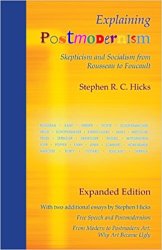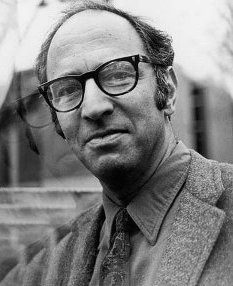In The Structure of Scientific Revolutions, Thomas Kuhn argues for metaphysical subjective relativism:
“the proponents of competing paradigms practice their trades in different worlds.”
In part, this is because scientists are not educated so much as brainwashed:
“the member of a mature scientific community is, like the typical character in Orwell’s 1984, the victim of a history rewritten by the powers that be.”
Consequently, Kuhn infers that science has nothing to do with anything called “truth”:
“We may, to be more precise, have to relinquish the notion, explicit or implicit, that changes of paradigm carry scientists and those who learn from them closer and closer to the truth.”
 For more on the meaning and implications of Thomas Kuhn’s contributions to postmodernism, see my Explaining Postmodernism: Skepticism from Rousseau to Foucault.
For more on the meaning and implications of Thomas Kuhn’s contributions to postmodernism, see my Explaining Postmodernism: Skepticism from Rousseau to Foucault.
Information about other editions and translations is available at this dedicated page.

I never got Kuhn and agree much more with Wienberg:
https://www.physics.utah.edu/~detar/phys4910/readings/fundamentals/weinberg.htmland found
Popper was correct but I thought too simplistic. This is not to slight his efforts, but only that this is so hard if you are carefull you do not capture all the subtleties.
I find Feynman much much better. We must accept some things as conventionally given to make progress. That’s why these days philosophy plays only a minor role in modern physics – you get further not worrying too much about things that get you into waters so deep it’s very hard to get out of it. You see it a lot in discussions about Quantum Mechanics. Actually QM is quite simple formally, In mathematical models like discreet time Markov Chains you can ask a reasonable question – what if we want to know the model in continuous time. It turns out you need something really weed – complex numbers as probabilities. QM is simply a way of trying to make sense of, on the surface, such a silly idea. Mathematicians do that sort of thing all the time. Does the resulting framework describe the world in some way? A lot of time such musings have no immediate application, but sometimes, like here, it does, and you get QM. Reading more into it than that is what gets people into trouble.